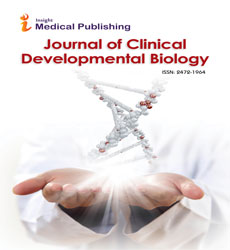An Editorial Note on Kidney Transplantation
Rakshitha Kotha
Rakshitha Kotha*
Department of Biochemistry, Osmania University, Hyderabad, Telangana, India
- *Corresponding Author:
- Rakshitha Kotha
Department of Biochemistry
Osmania University, Hyderabad, Telangana, India
Tel: +32-466-90-05-61
E-mail: raksh32311@gmail.com
Received Date: October 20, 2021; Accepted Date: October 25, 2021; Published Date: October 30, 2021
Citation: Rakshitha K (2021) An Editorial Note on Kidney Transplantation. J Clin Dev Biol. 6:02.
Editorial
Kidney transplantation
Kidney transplantation, now and again known as a renal transfer, is a treatment for kidney failure at end stage renal infection (ESRD). Renal transfer is a significant medical procedure during which an individual with kidney damage gets another kidney—either from a living contributor or a perished benefactor. A fruitful kidney relocate is nearest to normal kidney work and thought about the best treatment for ESRD—offering an opportunity for a more extended, better life.
You just need a working kidney to be sound, so just a kidney is relocated during a medical procedure. Your two unique kidneys will generally stay set up and the new benefactor kidney will be put in one more space of your midsection. The ureter (urine tube) joined to the benefactor kidney will then, at that point, be connected to your bladder. On the off chance that the kidney relocate a medical procedure is effective; your new kidney will assume control over the errands of separating your blood and making urine, very much like your own kidneys did before you had kidney illness.
Clinical experts will give you a total actual test, audit your wellbeing records, and request a progression of tests and X-rays to find out with regards to your general wellbeing. All that can influence how well you can deal with treatment will be checked. The assessment interaction for a transfer is exceptionally exhaustive. Your medical services group should realize a ton about you to help them—and you—choose if a transfer is ideal for you. One thing you can do to speed the interaction is to finish all the testing as fast as could be expected and stay in close contact with the transfer group. In case you're told you probably won't be appropriate for a transfer; don't be reluctant to inquire as to why—or on the other hand on the off chance that you may be qualified at some future time or at another middle. Keep in mind; being dynamic in your own consideration is probably the most ideal way of remaining sound. On the off chance that somebody you know might want to give a kidney to you, that individual will likewise have to go through a screening to see whether the person is a match and adequately sound to give.
The normal life expectancy of a transplanted kidney is 12-15 years; however a few transfers will endure longer. Certain individuals might require numerous transfers in the course of their life. In case you're in any case great wellbeing and your primary care physician confirms that you meet the necessities, a kidney relocate might be a decent choice. For the most part, specialists consider a kidney relocate to be the best kidney failure treatment, sooner rather than later.
Rejection
Ordinarily, your body rejects off anything that isn't important for itself, similar to microorganisms and infections. That arrangement of insurance is called your resistant framework. To prevent your body from rejecting or dismissing kidney, you should take medications to keep your safe framework less dynamic (called Anti-rejection drugs or immunosuppressant prescriptions). You'll have to accept them as long as your new kidney is working. Without them, your invulnerable framework would consider kidney to be "unfamiliar," and would attack or reject it. Immunosuppressant drugs can have some secondary effects.
Changing the portion or sort of medication can frequently facilitate to a lesser of the secondary effects. Other than the immunosuppressive meds, you will accept different prescriptions also. You will take prescriptions to shield you from contamination, as well. A great many people find taking medications a little exchange for the opportunity and personal satisfaction that an effective transfer can give.
Open Access Journals
- Aquaculture & Veterinary Science
- Chemistry & Chemical Sciences
- Clinical Sciences
- Engineering
- General Science
- Genetics & Molecular Biology
- Health Care & Nursing
- Immunology & Microbiology
- Materials Science
- Mathematics & Physics
- Medical Sciences
- Neurology & Psychiatry
- Oncology & Cancer Science
- Pharmaceutical Sciences
